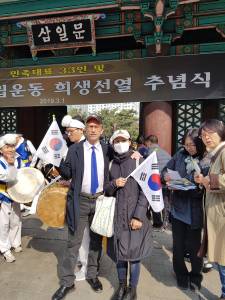 You will find me at Tapgol Park on the first day of March, every year—no exceptions. Of course, 2019 was especially important as it marked a century since the promulgation of the Korean Declaration of Independence. The air was bad in Seoul on that day, but I would not be deterred. This old park (the 10-story stone pagoda dates from the 15th century) has seen a lot of history, and I have deep affection for it.
You will find me at Tapgol Park on the first day of March, every year—no exceptions. Of course, 2019 was especially important as it marked a century since the promulgation of the Korean Declaration of Independence. The air was bad in Seoul on that day, but I would not be deterred. This old park (the 10-story stone pagoda dates from the 15th century) has seen a lot of history, and I have deep affection for it.
A bigger crowd than usual was present. While a program was to start later, I would see none of it; there was too much going on to just hang around. Banners and TV cameras abounded. A number of white-clad people were playing harmonicas, and far more banged gongs and drums (a 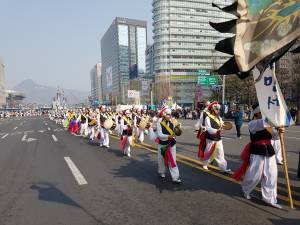 traditional musical form known as nongakdae) all around the park. They went up and down the sidewalk, and in circles. A man stood at the front gate and read the Declaration in a loud and solemn manner: “We hereby declare that Korea is an independent state and that Koreans are a self-governing people. We proclaim it to the nations of the world in affirmation of the principle of the equality of all nations, and we proclaim it to our posterity preserving in perpetuity the right of national survival. We make this declaration on the strength of 5,000 years of history as an expression of the devotion and loyalty of 20 million people….”
traditional musical form known as nongakdae) all around the park. They went up and down the sidewalk, and in circles. A man stood at the front gate and read the Declaration in a loud and solemn manner: “We hereby declare that Korea is an independent state and that Koreans are a self-governing people. We proclaim it to the nations of the world in affirmation of the principle of the equality of all nations, and we proclaim it to our posterity preserving in perpetuity the right of national survival. We make this declaration on the strength of 5,000 years of history as an expression of the devotion and loyalty of 20 million people….”
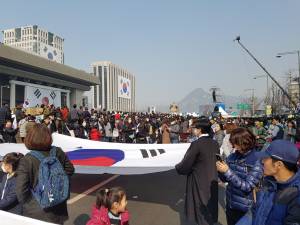 I walked a couple of blocks, turned left and made my way to an eight-story office building. There, exactly a century earlier, 33 bold and courageous men had gathered in the Taehwa Gwan (also known as Myeongwol Kwan) restaurant to sign and promulgate the Declaration of Independence, refuting all that the colonizing Japanese had done since their extralegal annexation in 1910. Knowing that a vigorous response would come, they emphasized that there was no feeling of enmity for the Japanese. The 33 marched to a nearby police station and turned themselves in just as a group of students read the Declaration aloud at Tapgol Park to a crowd that had gathered to mourn the recent death of King Gojong. As is well known, they answered with joyous cries of “long live independence!”
I walked a couple of blocks, turned left and made my way to an eight-story office building. There, exactly a century earlier, 33 bold and courageous men had gathered in the Taehwa Gwan (also known as Myeongwol Kwan) restaurant to sign and promulgate the Declaration of Independence, refuting all that the colonizing Japanese had done since their extralegal annexation in 1910. Knowing that a vigorous response would come, they emphasized that there was no feeling of enmity for the Japanese. The 33 marched to a nearby police station and turned themselves in just as a group of students read the Declaration aloud at Tapgol Park to a crowd that had gathered to mourn the recent death of King Gojong. As is well known, they answered with joyous cries of “long live independence!”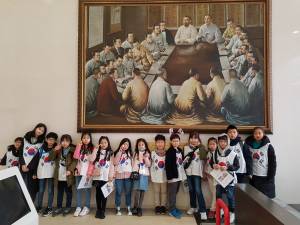
A short subway ride took me to Gwanghwamun Plaza where President Moon Jae-in was at the center of a large gathering to commemorate what had transpired 100 years ago. The taegukki was everywhere, although I had brought my own just in case. With the statues of King Sejong and Admiral Yi Sun-shin towering over the assembled multitude, I wandered all around this historic venue. The push-pull of Korean politics was evident even on such a day—I saw one banner about eradicating communism and another that spoke warmly of “Supreme Leader Kim Jong-un.”
Two days later, Sunday, I was back in that vicinity. At a nearby shop, I bought a café latte and a loaf of raisin bread. I consumed them while sitting on the chair next to Pyeonghwaui sonyeosang, the bronze statue of a so-called comfort woman that has placidly faced the Japanese Embassy since 2011 (once-a-week 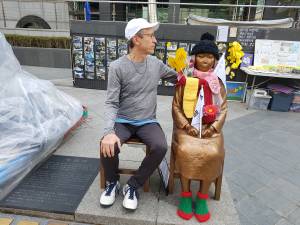 demonstrations began in 1992). Although I did not expect any dramatic revelations, I had come there to ponder and ruminate. I knew that starting in the late 19th century, the Japanese had been imbued with samurai spirit and found ways to justify taking economic, political and military control of their neighbor to the west. The strong dominating the weak is a theme that goes back in history thousands of years. There is no need to recapitulate all the wrongs done by the Japanese to the Koreans, of which forcing women into sexual slavery during World War II is just an example. Such a list would be very long indeed.
demonstrations began in 1992). Although I did not expect any dramatic revelations, I had come there to ponder and ruminate. I knew that starting in the late 19th century, the Japanese had been imbued with samurai spirit and found ways to justify taking economic, political and military control of their neighbor to the west. The strong dominating the weak is a theme that goes back in history thousands of years. There is no need to recapitulate all the wrongs done by the Japanese to the Koreans, of which forcing women into sexual slavery during World War II is just an example. Such a list would be very long indeed.
I sat there looking at a construction site where the Japanese Embassy is being rebuilt; its temporary home is the nearby Twin Tree Mall. To what extent do contemporary Japanese feel guilt or remorse for all that 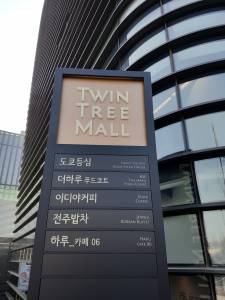 happened during the colonial era of 1910 to 1945 (keeping in mind that the takeover process actually began with the unequal treaty of 1876)? If I were of Japanese descent, I doubt I could blithely pass over such matters: “It’s unfortunate, it happened a long time ago, things are better now, etc.” I would strive to take stock of this history with clear eyes, abjuring nationalistic emotions. Many Japanese—although not all—have done so.
happened during the colonial era of 1910 to 1945 (keeping in mind that the takeover process actually began with the unequal treaty of 1876)? If I were of Japanese descent, I doubt I could blithely pass over such matters: “It’s unfortunate, it happened a long time ago, things are better now, etc.” I would strive to take stock of this history with clear eyes, abjuring nationalistic emotions. Many Japanese—although not all—have done so.
My friend Yoon Yong is old enough to have been born toward the end of the Japanese colonial era. Wasting no time with retrospection, he contends that all these issues were resolved by the 1965 treaty wherein diplomatic relations between Korea and Japan were reestablished, and loans and grants totaling $800 million were made. President Park Chung-hee, a man with an uncanny ability to make plans and implement them, used those funds to jump-start the modern Korean economy.

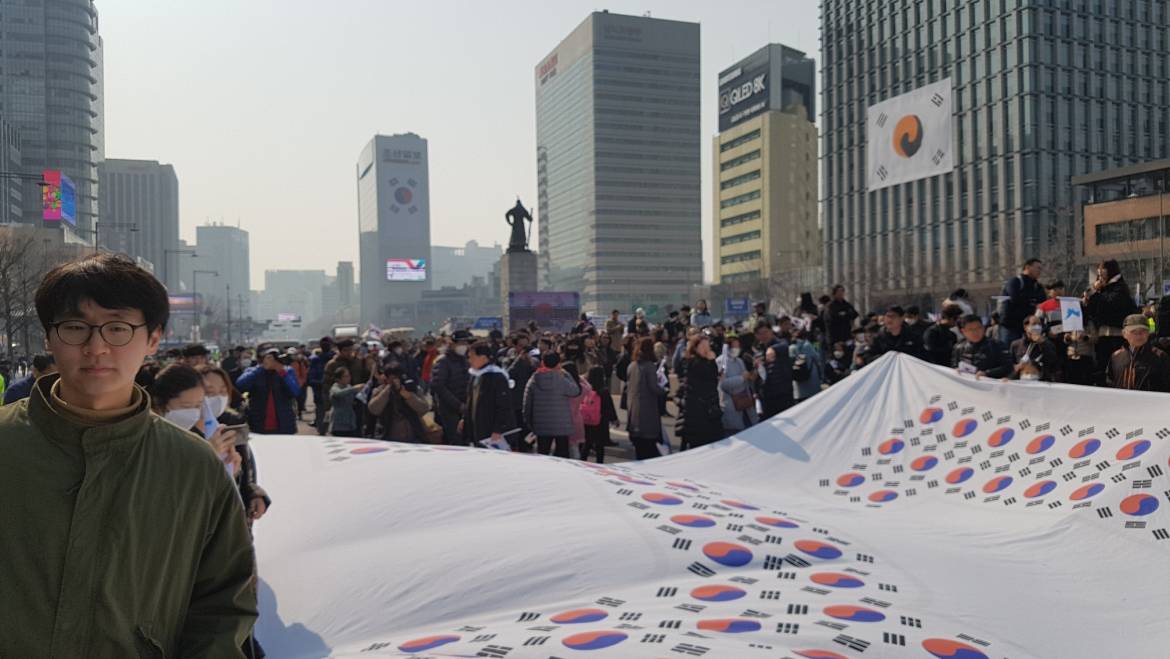
8 Comments
History tells us how the Japanese abused the countries they envade during the war. Sometimes , i asked myself if they are worth of forgiveness.. The anguish, the pains endured by women and children that time is beyond explaination. And that is the readon why their government make amends now.
You are in the Philippines, where a lot of Japanese cruelty was displayed.
What an interesting story for me and others outside Korea to understand the history. Thanks for sharing it. When I was young, I wanted to make history, not read about it. As I have aged history is an exciting place to be from time to time. You bring such history to life….Bravo!
Thank you so very much, Coach. You’ve made some history in the football realm.
Richard-Thanks-I did not know about the Japanese occupation of Korea until you informed me of it a few years ago. The Japanese military was absolutely criminal in WWII. I can’t imagine the suffering they caused in Korea,
To be honest, I did not know about it either until I got here back in 2007. Like you say, it’s amazing much misery the Japanese caused in those years. And it never occurred to them that they might lose.
A wonderful story about Korea’s Independence Day.
To many ordinary South Koreans, it is just one more holiday to enjoy, not remembered as the historic day to observe solemnly.
We just vaguely guess that many of our ancestors must have given their lives to achieve the independence back from harsh Imperial Japanese rule.
The normalization of diplomatic relations between South Korea and Japan helped in part the industralization and economic development of South Korea, resulting in materialism and complacence of ordinary South Koreans.
Sometimes we learn lessons from our own history by foreigners like Mr. Pennington and I think that we should be thankful for his wonderful article.
Thanks, Matthew. You are right that me being a foreigner gives me a different perspective on things.
Add Comment